First Time Playing: Gears of War: Judgement
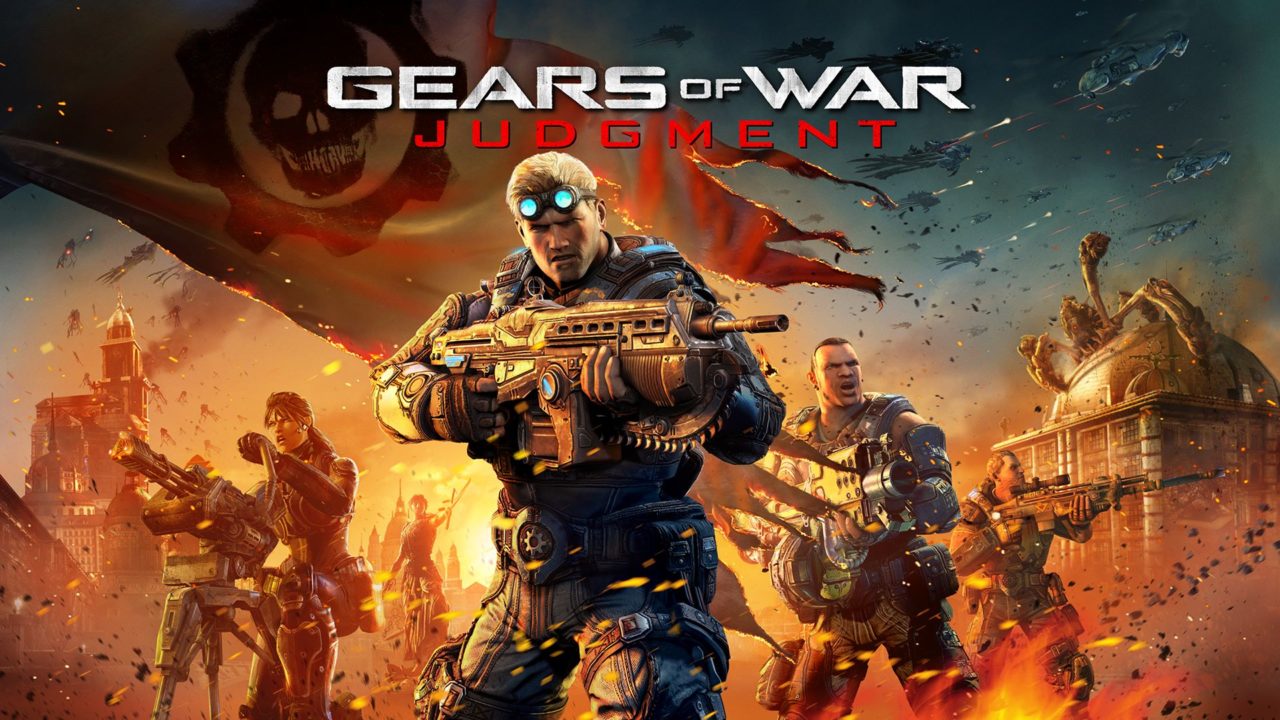
I’m on a quest to fill in the blanks of my gaming history by playing the Xbox games I had previously missed out on by for the longest time sticking exclusively to my PlayStation. The Gears of War franchise is my first port of call and while playing the first three games I became a big fan of series. Before making the next-gen leap to Gears of War 4, I decided to play the spin-off/prequel game Gears of War: Judgement; a game I’d heard very mixed opinions on in a franchise of otherly beloved games. I was on a big high after completing Gears 3, a game I enjoyed tremendously, and thought nothing could touch my newfound fandom of the franchise. Sadly, that was not the case. In fact, I think I kinda hate Gears of War: Judgement.
Let’s just start with the basic plot. Set years before the original trilogy and not long after ‘E-Day’, Judgement follows known characters Baird and Cole and their new squad mates as they try and free Halvo Bay from Locust control. The game has a neat framing device that sees the squad on trial before a makeshift military tribunal headed by Loomis, another in the long line of untrustworthy COG higher-ups. Through flashbacks and voice-overs, each squad member tells a part of the tale that ultimately led to them being on trial, with the player taking control of every character for a chapter. This is a cool idea, but the actual narrative of how the characters ended up facing treason charges is incredibly disappointing and simplistic. The bulk of the plot finds the squad going against orders to find a professor who has a WMD that’d destroy the Locust. Now, where have I heard that before? Oh yeah, Gears of War 3. The story is just a much more simplistic version of that earlier, and much better, game. Away from the initially interesting premise and framing device, there’s nothing intriguing about the plot whatsoever. It’s so unimaginative and basic, and reeks of a storyline quickly put together as an excuse to make another game for financial gain with no creative vision behind it.
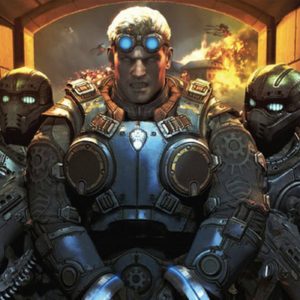 After playing the Gears trilogy I had so many questions about the past of the conflict with the Locust, the Pendulum Wars and even what happened during the time between the games. I know novels and comics began to fill in those blanks, but plugging into that backstory is surely the point of a prequel game. To flesh out that which was only previously hinted at. But instead we get a narrative revealing a backstory never mentioned in the previous games and therefore can’t have anything particularly dramatic happen within, at least with the characters we know, without creating continuity problems. Apparently, Baird and Cole were (briefly) war criminals, something they keep schtum about in the following years. Is that interesting? Not really. It just feels like creating drama for drama’s sake. I didn’t need them to have some huge epic backstory. Marcus was the one who had that in the first three games. He was even a criminal soldier! Why not tell his story set before the first Gears of War? About how he put his father before his men and was imprisoned for it. Now that’s something I’m interested in knowing more about. It’s a cool story by itself and can standalone, but it also informs so much of what we know will happen later too, like the best prequels do. With that idea you could have even kept the military tribunal framing device too, with Marcus being sentenced at the end of the game which links to when he’s busted out of prison at the start of the original Gears of War. Instead, Judgement gives us a new story that can’t affect the characters in any significant way and offers no additional insight into the events of the other games.
After playing the Gears trilogy I had so many questions about the past of the conflict with the Locust, the Pendulum Wars and even what happened during the time between the games. I know novels and comics began to fill in those blanks, but plugging into that backstory is surely the point of a prequel game. To flesh out that which was only previously hinted at. But instead we get a narrative revealing a backstory never mentioned in the previous games and therefore can’t have anything particularly dramatic happen within, at least with the characters we know, without creating continuity problems. Apparently, Baird and Cole were (briefly) war criminals, something they keep schtum about in the following years. Is that interesting? Not really. It just feels like creating drama for drama’s sake. I didn’t need them to have some huge epic backstory. Marcus was the one who had that in the first three games. He was even a criminal soldier! Why not tell his story set before the first Gears of War? About how he put his father before his men and was imprisoned for it. Now that’s something I’m interested in knowing more about. It’s a cool story by itself and can standalone, but it also informs so much of what we know will happen later too, like the best prequels do. With that idea you could have even kept the military tribunal framing device too, with Marcus being sentenced at the end of the game which links to when he’s busted out of prison at the start of the original Gears of War. Instead, Judgement gives us a new story that can’t affect the characters in any significant way and offers no additional insight into the events of the other games.
Judgement’s story is not worthy of existing. The squad decide to go against orders and fire a Lightmass missile at Halvo Bay to eliminate the Locust, who are led by a big baddie called Karn. Eventually, after numerous quests designed to stretch out the slight story for as long as possible, including finding the professor who made the bomb and the launch codes needed to fire it, they detonate the weapon and seemingly kill Karn. They are arrested and put on trial for disobeying orders until – shocker – they discover that Karn is still alive and the Lightmass did nothing. After fighting alongside Loomis, they manage to kill Karn for good and are pardoned for their actions, with only Baird getting a demotion. That’s right, both of the dramatic pulls of the story – the unsanctioned detonation of the Lightmass and the military tribunal – have no meaningful consequences. The bomb destroys a large section of the city but does absolutely nothing, and Loomis is won over after fighting alongside the squad and simply decides not to charge them with anything. Consequences are the key to drama and Judgement is ultimately a meaningless tale where nothing significant happens and the characters learn nothing.
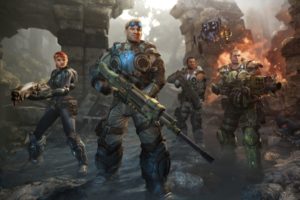 The characters of the earlier Gears games are beloved, but here… yeesh. In the previous games Baird was comedic relief and his wit was his defining feature. But in the act of turning a fun side character into the dramatic lead, Baird is almost humourless and loses the one thing he had going for him. On the other hand, Cole is essentially the same character we know but with barely any lines. You could be forgiven for forgetting he was present for most of the game. Did the developers only get limited time with the voice actor or something? Sophia is a new character and there’s not one interesting thing about her. Her only notable attribute is that she was having a secret affair with Professor MacGuffin, and I don’t think that’s the best way to highlight the most significant female character in the series up to this point. Paduk is the character who has the most potential. He’s a ‘space Russian’, or an ex-UIR soldier turned COG in the lore of the game. He fought against the COG in the oft mentioned Pendulum Wars before teaming up with them when the Locust attacked. It’s a great character backstory but sadly backstory is all it is, and apart from a few quips that mention his history, he simply becomes another regular COG soldier. Speaking of quips, there’s very little banter between the squad members, which is vital in building attachments to these characters like we do with Marcus and Dom in earlier games, and that’s a big reason why none of the new characters – or existing characters for that matter – click.
The characters of the earlier Gears games are beloved, but here… yeesh. In the previous games Baird was comedic relief and his wit was his defining feature. But in the act of turning a fun side character into the dramatic lead, Baird is almost humourless and loses the one thing he had going for him. On the other hand, Cole is essentially the same character we know but with barely any lines. You could be forgiven for forgetting he was present for most of the game. Did the developers only get limited time with the voice actor or something? Sophia is a new character and there’s not one interesting thing about her. Her only notable attribute is that she was having a secret affair with Professor MacGuffin, and I don’t think that’s the best way to highlight the most significant female character in the series up to this point. Paduk is the character who has the most potential. He’s a ‘space Russian’, or an ex-UIR soldier turned COG in the lore of the game. He fought against the COG in the oft mentioned Pendulum Wars before teaming up with them when the Locust attacked. It’s a great character backstory but sadly backstory is all it is, and apart from a few quips that mention his history, he simply becomes another regular COG soldier. Speaking of quips, there’s very little banter between the squad members, which is vital in building attachments to these characters like we do with Marcus and Dom in earlier games, and that’s a big reason why none of the new characters – or existing characters for that matter – click.
And don’t even get me started on the villain. Karn is supposed to be an incredibly intimidating presence that causes Baird and co to seek extreme measures in taking him out, and yet he’s a complete non-character. We see him briefly during a cutscene at the start of the game in which he just stands there doing nothing, and then we don’t see him again until the bomb is dropped on his head. Somehow, he survives the nuke landing on his forehead and you encounter him again (or actually for the first proper time) in the game’s final minutes for a lacklustre boss battle. You shoot a leg off the big monster thing he rides on and he ultimately falls off it and dies on the courthouse steps. Even RAAM from Gears 1 was better, and that’s saying something.
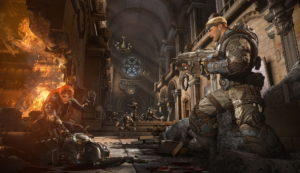 I guess it’s time to discuss the gameplay modifiers that plague the “campaign mode” of the game. And yes, I put campaign mode in quote marks because the modifiers turn it into nothing but some challenge maps linked by a voice-over giving the illusion of plot. At the start of each level you can decide whether to activate a gameplay modifier to gain more points. Often the modifiers will make the weather conditions worse, restrict what guns you can use or introduce harder enemy types. And I outright hate them. The modifiers themselves are a mixed bag but it’s how it changes the game that I hate. It’s no longer about telling a story; it’s about accumulating points to buy weapon skins. The modifiers mean that the campaign has to be chopped up into little levels that resemble challenge maps so the points can be toted up before you move on to the next area. This becomes incredibly formulaic. There’s a voice over intro that reminds you that there’s apparently a story being told, you choose if you want a modifier, you complete the task given to you – whether it be to get from A to B, survive enemy waves, etc. – and then a progress screen pops up that counts how many points and stars you got. Cue the voice-over outro. Rinse and repeat.
I guess it’s time to discuss the gameplay modifiers that plague the “campaign mode” of the game. And yes, I put campaign mode in quote marks because the modifiers turn it into nothing but some challenge maps linked by a voice-over giving the illusion of plot. At the start of each level you can decide whether to activate a gameplay modifier to gain more points. Often the modifiers will make the weather conditions worse, restrict what guns you can use or introduce harder enemy types. And I outright hate them. The modifiers themselves are a mixed bag but it’s how it changes the game that I hate. It’s no longer about telling a story; it’s about accumulating points to buy weapon skins. The modifiers mean that the campaign has to be chopped up into little levels that resemble challenge maps so the points can be toted up before you move on to the next area. This becomes incredibly formulaic. There’s a voice over intro that reminds you that there’s apparently a story being told, you choose if you want a modifier, you complete the task given to you – whether it be to get from A to B, survive enemy waves, etc. – and then a progress screen pops up that counts how many points and stars you got. Cue the voice-over outro. Rinse and repeat.
The modifiers and mission structure mean that just when you’re getting involved in the story you get pulled out to look at a progress screen. They should have made this into an extra challenge mode instead of forcing it on the story. The campaign feels less like a separate narrative and more of an additional mode that exists to simply unlock items for multiplayer. As soon as I earned enough stars to unlock the additional Aftermath campaign, I just ignored the modifiers unless they were interesting. They take the freedom to play how you want away from you. Even in my beloved Assassin’s Creed franchise, I disliked the optional objectives that began in Brotherhood because it forced you to play the game in a certain way, often a way I didn’t want to.
 The modifiers aren’t the only way Judgement changes the type of gameplay the series is known for. There’s far less emphasis on cover-based shooting, which is strange because that was probably the franchise’s most recognisable mechanic. This means there are less wide-open spaces like the plazas and streets of the previous games. Instead, there’s more close quarters action which as an idea is fine, but your fellow AI squad mates are a little too eager and get in the way in the narrow spaces. I ended up shooting them more than the enemy. The developers are trying to make the game feel faster, with more run and gun action and modifiers that give you a time limit to reach locations. I just couldn’t enjoy it because I wanted to take in the story and locations. I was constantly worrying about which gun I had to use for the modifier and how much time I had left before I had to reach the next objective. It just wasn’t fun.
The modifiers aren’t the only way Judgement changes the type of gameplay the series is known for. There’s far less emphasis on cover-based shooting, which is strange because that was probably the franchise’s most recognisable mechanic. This means there are less wide-open spaces like the plazas and streets of the previous games. Instead, there’s more close quarters action which as an idea is fine, but your fellow AI squad mates are a little too eager and get in the way in the narrow spaces. I ended up shooting them more than the enemy. The developers are trying to make the game feel faster, with more run and gun action and modifiers that give you a time limit to reach locations. I just couldn’t enjoy it because I wanted to take in the story and locations. I was constantly worrying about which gun I had to use for the modifier and how much time I had left before I had to reach the next objective. It just wasn’t fun.
Unlike the previous Gears games, there’s nothing to break up the monotony of the swarm-based ground combat. There are no vehicle missions, either driveable or on rails, or areas to explore without combat. 30 seconds in to each chapter you’re thrown into a gunfight that lasts until the end of the chapter and you’ve reached your destination. I love the Gears combat but it can be grating after a while. You need a break from chainsaw decapitations and shooting scaly bodies with absurd amounts of bullets, and the unique missions and set pieces did that in previous games. Missions like the submarine in Gears 3, or the driveable tanks in the first two games. Even a cool location like the giant worm in Gears 2 would be refreshing. Instead, every single level in Judgement is set on the crumbling streets of Halvo Bay. It got boring really fast.
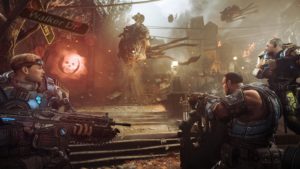 After Gears of War 3 introduced the Lambent and all those amazing new enemy types, returning to the same old Locust enemies is pretty dull. It’s a sacrifice of doing a prequel that the enemies they made clear they were facing for the first time in the other games can’t appear in Judgement. However, the game does mix things up by having the enemies change every time you play. It’s a neat concept but I feel that levels should be designed to feature appropriate enemies. In huge open spaces you want grunts and boomers to take out over large distances, but this randomness means you’re just as likely to get tickers and other close quarters enemies. Oh, you’re given a mortar to wipe out Locust from afar? Too bad, we’re swarming you with wrenches. It’s just a bit gimmicky and I found myself dying on purpose in the hope I got better/more interesting/easier enemies to kill when I respawned. Sometimes there are too many of the same type of special enemies that spawn together. You want one Kantus to 10 regular soldiers, not the other way around. Enemies are now more likely to rush you and so your over-eager squad rushes them and it turns into a giant mess. I found myself just firing wildly while trying to run away. Again, instead of introducing something new, the game is just remixing and finding new ways to present what has come before in previous games. And those new ways are often worse.
After Gears of War 3 introduced the Lambent and all those amazing new enemy types, returning to the same old Locust enemies is pretty dull. It’s a sacrifice of doing a prequel that the enemies they made clear they were facing for the first time in the other games can’t appear in Judgement. However, the game does mix things up by having the enemies change every time you play. It’s a neat concept but I feel that levels should be designed to feature appropriate enemies. In huge open spaces you want grunts and boomers to take out over large distances, but this randomness means you’re just as likely to get tickers and other close quarters enemies. Oh, you’re given a mortar to wipe out Locust from afar? Too bad, we’re swarming you with wrenches. It’s just a bit gimmicky and I found myself dying on purpose in the hope I got better/more interesting/easier enemies to kill when I respawned. Sometimes there are too many of the same type of special enemies that spawn together. You want one Kantus to 10 regular soldiers, not the other way around. Enemies are now more likely to rush you and so your over-eager squad rushes them and it turns into a giant mess. I found myself just firing wildly while trying to run away. Again, instead of introducing something new, the game is just remixing and finding new ways to present what has come before in previous games. And those new ways are often worse.
This is not to say there’s nothing I enjoyed about the game. The game is the best looking of the franchise I’ve played so far and the cityscapes look fantastic, even if they are contained to the single city of Halvo Bay and don’t have huge variation. At one point you come across the remnants of a victory parade that was occurring when the Locust attacked on ‘E-Day’, which makes for a cool new location and atmosphere, and offers some interesting dialogue from Paduk who was on the losing side of the “victory”. There’s a chapter set in the suburbs of the city and has you battling in and around mansions, which is a refreshing new type of location for the series. I also like that you don’t need to pick up ammo boxes off the ground. The ammo is automatically picked up when walking over it. At least it is some of the time and other times you still have to pick it up manually and I couldn’t work out why that was.
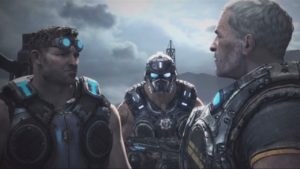 After the main game is complete you can play the Aftermath mini-campaign which is set during the events of Gears 3. Happily, it has the same structure as that earlier game and gone are the annoying modifiers and constant pauses in gameplay. The missions just flow together into one constant narrative. There are large areas where you can go off the beaten path, you can find items that initiate new dialogue and it’s more atmospheric than the main game. You’re not constantly pushed into combat but instead some sequences revel in the tension that comes before a fight. This is most true in the abandoned hospital where you are hunted by zombies. It’s a great horror sequence and the best of the entire game. The story of Aftermath is once again paper thin and fairly uninteresting – with Paduk returning as COG-hating loner and Sophia missing – but, after the bulk of Judgement, it was a joy to play.
After the main game is complete you can play the Aftermath mini-campaign which is set during the events of Gears 3. Happily, it has the same structure as that earlier game and gone are the annoying modifiers and constant pauses in gameplay. The missions just flow together into one constant narrative. There are large areas where you can go off the beaten path, you can find items that initiate new dialogue and it’s more atmospheric than the main game. You’re not constantly pushed into combat but instead some sequences revel in the tension that comes before a fight. This is most true in the abandoned hospital where you are hunted by zombies. It’s a great horror sequence and the best of the entire game. The story of Aftermath is once again paper thin and fairly uninteresting – with Paduk returning as COG-hating loner and Sophia missing – but, after the bulk of Judgement, it was a joy to play.
I remember that after playing Gears of War 3 I was conflicted to whether I should jump straight to Judgement or go back and replay the first three games again. I had become a fan of the franchise and wanted to re-experience those great games again, but instead I went straight to Gears of War: Judgement believing, as such a fan of the franchise, I would enjoy a new game as much as the ones I was familiar with. Turns out, I was very wrong. I don’t like Judgement at all and yet part of me is very glad that I played it. In failing in so many respects, Judgement has shown me why I enjoyed those previous three games as much as I did, even shedding light on reasons I was blind to before. It was like I needed to see the negative before I fully appreciated the positive. And in terms of showing me what it was I wouldn’t like in these games, Judgement practically gift-wrapped them for me.
Next up I’ll be playing and writing about the start of a new trilogy in Gears of War 4 before the impending release of Gears 5 this September. At the moment however, how do feel about Gears of War: Judgement? Am I wrong in my analysis? Let me know in the comments and geek out with me about TV, movies and video-games on Twitter @kylebrrtt.




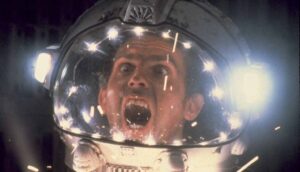
You guys are dead to me. Xbox 360!! We’re now a month away from Gears 5. And only NOW your playing Judgement. Pffft
From Kyles experience, Judgement seems like the one to miss.
Ben Nother depends on how you play It and how you feel about Gears. If your Delta. You love any gears game. Judgement is a bridging game and tells the story of how baird got help for gears 3 final assault. Also… You either play it on hardcore.. Or your not delta!!!